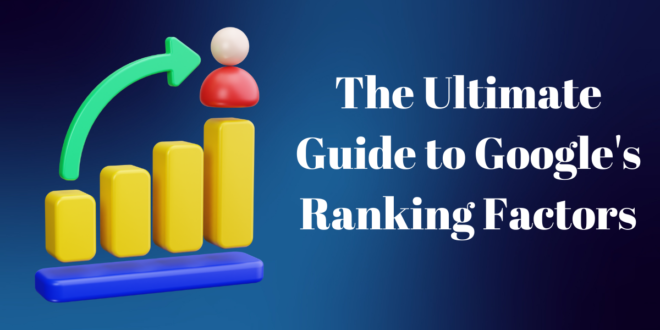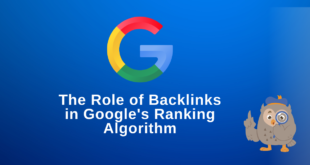What are Google’s Ranking Factors?
Google’s ranking factors are signals the search engine uses to evaluate and rank websites. These factors aim to provide users with the most relevant, trustworthy, and high-quality results. Mastering them can significantly boost your online visibility.
Key Google Ranking Factors in 2024
The Ultimate Guide to Google’s Ranking Factors: Core Elements
The foundation of your website’s ranking lies in several core areas. Understanding and optimizing these areas can push your site higher in the search engine results pages (SERPs). Here are the most critical factors:
1. Content Quality and Relevance
Google’s priority is delivering valuable, informative content that answers users’ queries. The better your content aligns with user intent, the more likely it is to rank higher. Ensure your content is detailed, comprehensive, and offers unique insights. Tools like Google’s Search Console can help you track the performance of your content and improve areas where engagement is low.
Including relevant keywords, such as “The Ultimate Guide to Google’s Ranking Factors,” naturally within your content will help enhance visibility. Google is becoming increasingly sophisticated at understanding context, so focus on providing useful, engaging material rather than stuffing keywords.
2. Mobile-Friendliness
With more than half of internet traffic coming from mobile devices, having a mobile-friendly website is essential. Google’s mobile-first indexing means the mobile version of your site is the primary factor in how it ranks. If your website isn’t optimized for mobile devices, you risk losing significant traffic and ranking potential.
Ensure that your site’s design is responsive, load times are optimized, and the user experience on mobile is seamless.
3. Page Speed and User Experience
Page speed is a critical factor in Google’s ranking algorithm. Slow-loading sites are penalized, particularly on mobile devices. Google’s Core Web Vitals metrics now play a vital role in determining your site’s performance. These metrics assess the speed, interactivity, and visual stability of your web pages. Optimizing your site for fast load times will help improve not only your ranking but also user engagement.
For an in-depth understanding of how Google evaluates site performance, visit this guide on Google’s Algorithm and Ranking Factors.
4. Backlinks and Link Quality
Backlinks remain one of the most influential ranking factors. Google considers the quantity and quality of backlinks pointing to your site when determining its authority and relevance. High-quality backlinks from authoritative sites act as a vote of confidence, improving your site’s credibility.
It’s essential to have a balanced backlink profile that includes both dofollow and nofollow links. For more information, you can check out this guide on the differences between dofollow and nofollow backlinks.
Advanced Ranking Factors to Consider
Beyond the basic ranking elements, several advanced factors can give your site a competitive edge.
5. On-Page SEO Optimization
On-page SEO refers to optimizing individual pages to rank higher and attract more traffic. This involves:
- Keyword optimization in titles, headers, and meta descriptions.
- Image alt text that describes the content accurately.
- Internal linking to distribute authority and help search engines crawl your site.
Maintaining proper URL structures, having well-optimized header tags (H2, H3, etc.), and using schema markup can significantly impact your rankings.
6. Secure and Accessible Website (SSL)
Google has long emphasized the importance of secure websites. Sites without SSL certificates (those without HTTPS) are often flagged as unsafe, which can negatively impact both rankings and user trust. Make sure your website has an SSL certificate and that every page uses secure encryption.
7. User Engagement and Behavior Signals
Google also tracks how users interact with your site. Metrics like click-through rate (CTR), bounce rate, and dwell time give Google signals about the user experience. Websites with higher engagement levels are rewarded with higher rankings. Create engaging content that encourages users to spend more time on your site, explore different pages, and interact with your material.
8. Social Signals
While social media signals (such as likes, shares, and comments) aren’t direct ranking factors, they can have an indirect impact. A strong social presence can lead to more backlinks, improved brand visibility, and traffic, all of which contribute to better SEO performance.
Why Google’s Algorithm Updates Matter
Google’s algorithm is constantly evolving. Every year, hundreds of changes are made to ensure users get the best search experience. These updates often affect how sites rank. To stay ahead, you need to stay informed about the latest changes and adjust your SEO strategies accordingly. Keeping up with algorithm updates ensures you won’t be caught off guard when changes occur.
9. E-A-T: Expertise, Authoritativeness, Trustworthiness
In 2024, Google’s focus on E-A-T (Expertise, Authoritativeness, Trustworthiness) has become even more important, especially for sites in the health, finance, and legal sectors. Google wants to ensure that the information it ranks is coming from credible sources. Therefore, regularly updating your site with accurate, well-researched content is essential.
Conclusion: Staying Ahead in Google’s Ranking Factors
Understanding and implementing Google’s ranking factors is essential to improve your website’s visibility. Focusing on content quality, user experience, mobile optimization, and backlinks will put you on the right path to higher rankings. Keep an eye on algorithm changes, and regularly optimize your site to stay competitive in 2024.
Frequently Asked Questions (FAQs)
What is the most important ranking factor in Google’s algorithm?
While there isn’t a single most important factor, content quality, backlinks, and mobile-friendliness are among the top ranking elements Google considers.
How often does Google update its ranking algorithm?
Google updates its ranking algorithm hundreds of times each year. Major updates are announced, but smaller changes happen almost daily.
Do backlinks still matter for ranking in 2024?
Yes, backlinks remain one of the most influential ranking factors. However, the quality of backlinks is more important than the quantity.
What is E-A-T, and why is it important?
E-A-T stands for Expertise, Authoritativeness, and Trustworthiness. Google uses this framework to evaluate the credibility of content, especially in critical sectors like healthcare and finance.
How can I improve my website’s page speed?
Improving page speed involves optimizing images, minimizing JavaScript, enabling browser caching, and using a content delivery network (CDN). Google’s Core Web Vitals provide specific metrics to help you gauge your page speed performance.
This guide provides the foundation needed to improve your site’s ranking while keeping up with the ever-evolving Google algorithm.
 High-Quality Backlinks for SEO Success | Backlink eStore
High-Quality Backlinks for SEO Success | Backlink eStore




